- Editorial Offices
- 325 Brantly Hall
- Missoula, MT 59812
- (406) 243-2488
- themontanan@umontana.edu
- Icons By Maria Maldonado
On the biggest stage in Hollywood, Oscar-winner J.K. Simmons ’78 delivers a simple yet potent message: Call your mom and dad, because he can’t call his
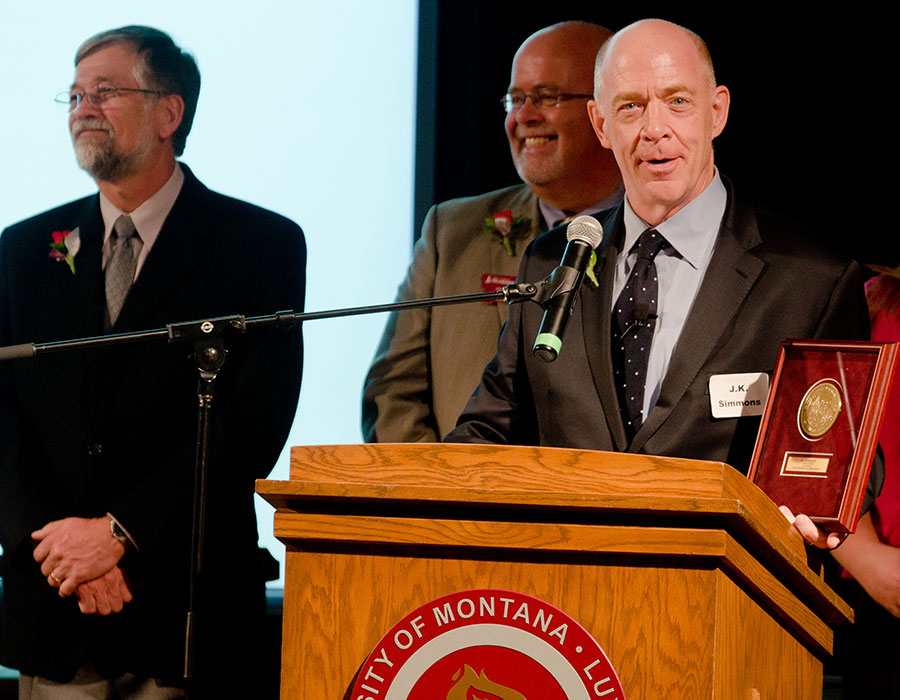
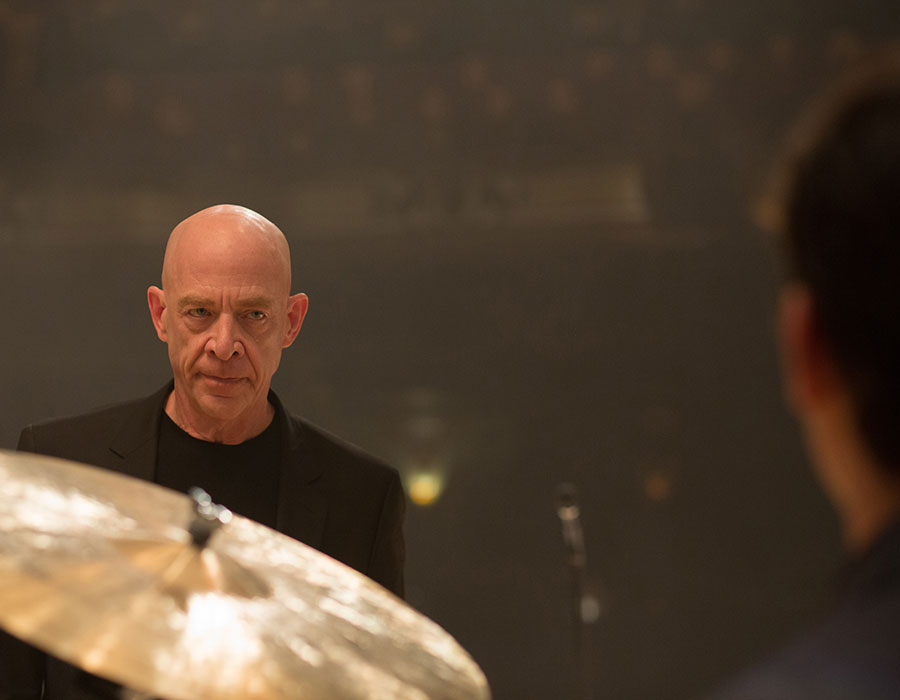
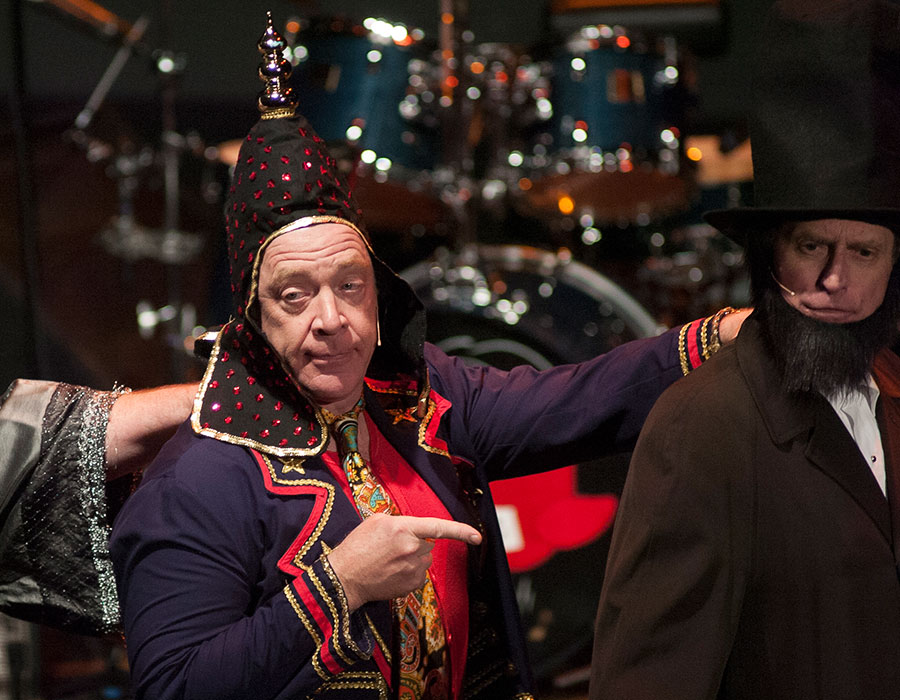

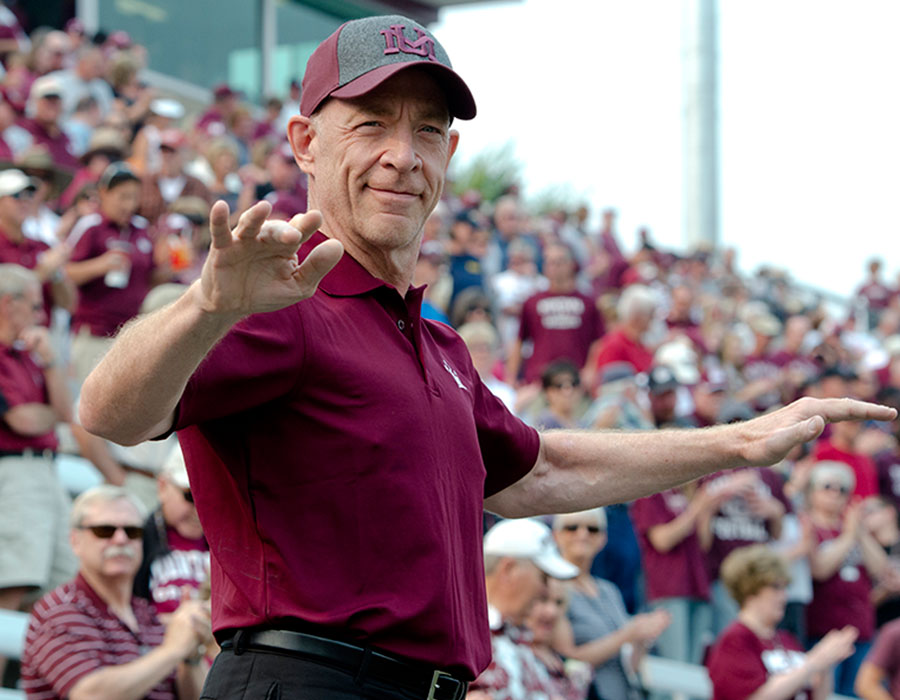
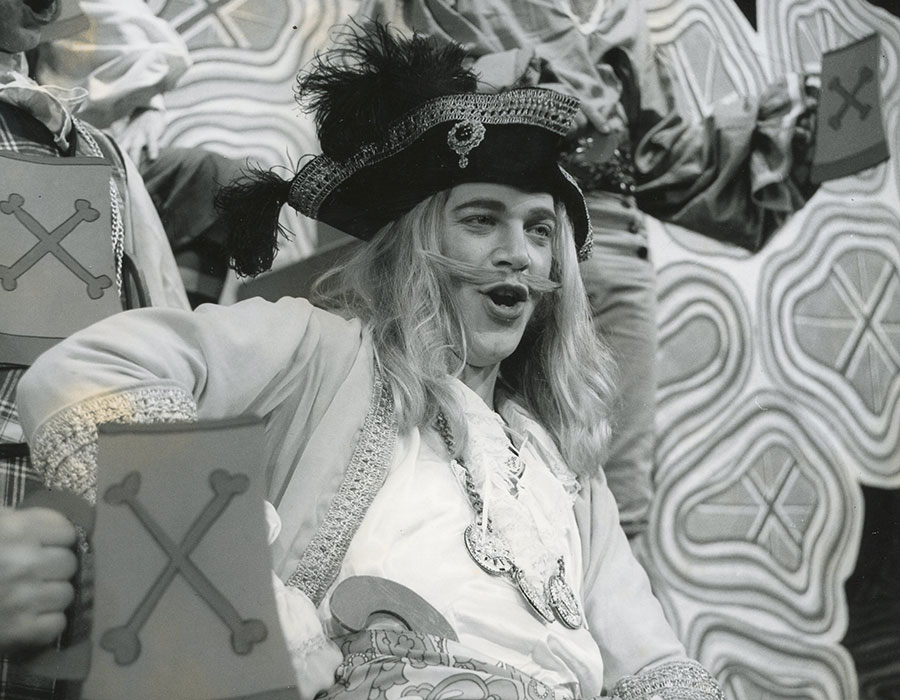

He didn’t thank his agent, and he didn’t thank his publicist. He didn’t plead for a worthy political cause, and he didn’t thank God, or engage in any other clichés of Academy Award acceptance speeches.
Instead, J.K. Simmons, first-time Oscar winner and overnight success after four decades of hard work, strode in a crisp, black tuxedo to a center-stage podium in Hollywood in February and delivered an impromptu speech that, for a moment, slowed down the world.
“Call your mom. Call your dad,” he told the audience. “If you’re lucky enough to have a parent or two alive on this planet, call them. Don’t text. Don’t e-mail. Call them on the phone. Tell them you love them, and thank them, and listen to them for as long as they want to talk to you.”
A theater full of the biggest celebrities—the beautiful, the hunky, the constantly celebrated—responded to this unpretentious honesty from a sixty-year-old bald man like flowers touched by sunlight.
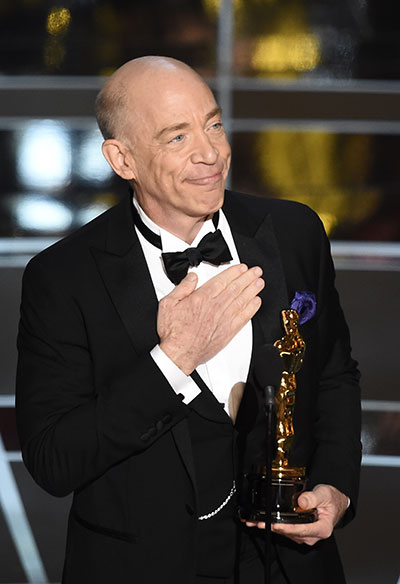
Then came the next day’s headlines: “J.K. Simmons Lit Up Oscars With Simple Message” [USA Today]; “J.K. Simmons Has Become the MVP of Hollywood’s Award Season” [Detroit Free Press]; “The Only Good Oscar Speech” [Daily Caller].
Social media sites flickered out his name. Strangers stopped him on streets and told him he made them reconnect with long-estranged mothers and fathers.
“Honestly, it never occurred to me that it would have that kind of impact,” Simmons says a few weeks later by phone from Los Angeles. “But when it did, it’s a beautiful feeling. If my forty-five seconds accomplished anything, it let people know how important family is to me, whether it’s my wife, my kids, my folks. And if I’m the catalyst for somebody reaching out to their parents, then that’s the best legacy I could possibly ask for.”
Around the world, the speech sounded like a tribute to all parents, and it was. But in Missoula, the importance was far greater. Greater, certainly, than the first acting Oscar for a UM graduate or the first for a working actor reared in Montana since Gary Cooper in the early 1940s.
Simmons had honored his own parents, Don and Pat Simmons. For decades, Don and Pat were volunteers, artists, activists, and community pillars who cultivated in their adopted mountain hometown the same excellence they did in their three children.
They also passed away in Missoula in 2012 and 2014, respectively.
“After I stopped weeping, he and I talked a lot about that speech,” says Simmons’ younger brother, David, a music teacher and composer. “I think he realized he had a billion people watching, and this is what really matters: We had a great family.”
Born: Jan. 9, 1955 in Grosse Point, Mich.
Parents: Don and Pat Simmons
Siblings: Elizabeth Simmons-O’Neill, David Simmons
Graduated University of Montana: 1978
Cities lived in: Seattle, New York, Los Angeles
Wife: Michelle Schumacher
Children: Joe Simmons, Olivia Simmons.
Don and Pat were born in the flatlands of Illinois at the end of the 1920s, the dawn of the Great Depression—she in South Chicago, he on a farm. Through the lean years of World War II they each took joy in family, and in singing. Eventually, they enrolled at Knox College in Galesburg, Ill. They met when cast together in an operetta called The Desert Song.
In 1951, they married and became unshakable complements to each other. Don served in the Army; Pat worked for the Army. Don taught music in public schools near Detroit; Pat taught French. When Don joined the music faculty at Ohio State University, Pat took a job as an arts publicist. They had three children: Elizabeth, Jonathan Kimble, and David.
In 1973, Don applied for the job of chair of the Department of Music at UM.
“When he went out to interview for the job, he told my mom, ‘Boy, I sure hope they offer me this job,’” J.K. Simmons says, “’because this is where I want to live for the rest of my life. This is where I want us to be.’”
When hired, Don Simmons organized a reunion for all his extended family in Yellowstone National Park to show off his new home. At the time, his oldest son, who as a boy so looked up to his father’s ability to conduct music, was an aimless freshman at Ohio State University. When his dad got the UM job, he—unlike the multitudes of college students who try to get as far away from their parents as possible—packed up a U-Haul and followed. Soon, all three Simmons siblings again lived in the same house, this one on Eddy Street a few blocks from the UM Music Building, with their parents and grandmother.
“We had three generations under one roof,” Simmons says. “I fell in love with the mountains, the sky and just … Montana.”
Theirs was a unique and rich home. Nightly dinners around the family table featured talk of politics and literature, plus the singing of Renaissance music. They also harmonized around the living room piano. On Sundays, Don cooked big brunches for dozens of guests, and his Christmas dinners were legendary. Pat taught her kids manners by cupping their faces in her hands to better command their attention. She and Don then clapped louder than anyone at all of their children’s performances.
“They wanted us to be who we wanted to be,” Simmons says, “and do what we wanted to do.”
In those days, Simmons sported straight, blond hair that hung down to his waist. He was a standout opera singer, and he conducted choirs, bands, and orchestras—just like his dad.
“It was just real natural to follow in Dad’s footsteps,” he says. “I wanted to be a conductor.”
This changed when, at his brother’s suggestion, he took a role as a singer in a production of Oliver directed by Jim Caron at his new Missoula Children’s Theatre. A few months later, just graduated from UM, Simmons was in Caron’s office when the owners of the Bigfork Summer Playhouse called. They needed a conductor. Simmons took this job, but soon got another—the lead role in the musical Brigadoon.
“That was when I really, firmly got bit by the acting bug,” he says.
Caron remembers Don and Pat at one of these early performances, beaming.
“They were incredibly supportive,” Caron says, “of everything he did.”
Don and Pat kept up their cheers after Simmons left to pursue acting, first in Seattle and then on Broadway in New York City.
But along the way, he lost his hair, and something else—the close contact he once shared with his parents. Songs around the dinner table turned to handwritten letters pushed into mailboxes from 2,000 miles away and, when there was money to splurge on more than stamps, long-distance phone calls.
“When I was in my twenties and sort of out finding myself,” Simmons says, “weeks would go by and I wouldn’t be in touch.”
His career climbed, slow and steady. On Broadway in the early 1990s, he scored starring roles in Guys and Dolls and, fatefully, in Peter Pan, where he met his wife, an aspiring filmmaker with blonde hair and deep blue eyes in the role of Tiger Lily, Michelle Schumacher. He then transitioned to TV commercials and shows, notably the dramas Homicide: Life on the Streets, Law and Order, and HBO’s Oz. By the late 1990s, he earned steady work in movies and made another cross-country move, this one to Los Angeles.
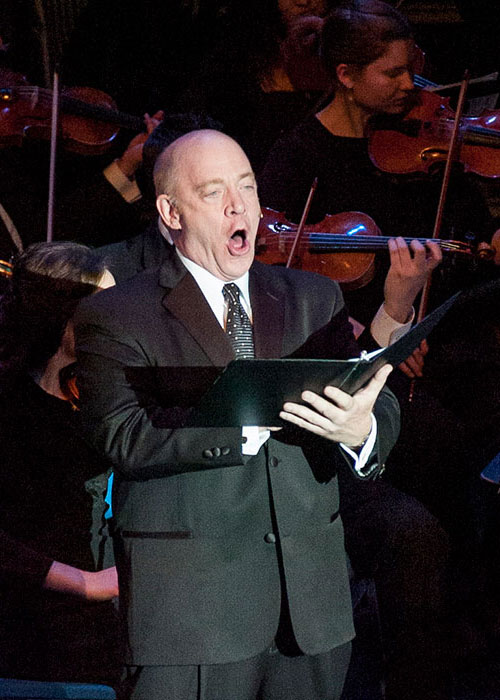
Don, meanwhile, retired from UM in 1993. But he and Pat then dedicated their lives to volunteerism, charity, and civics in Missoula.
She became executive director of the Missoula Downtown Association and created the popular Out To Lunch weekly summer event that features food vendors and live music in Caras Park. She also was a member of the City of Missoula Police Commission. Don served on the board of the United Way of Missoula County and the Missoula Symphony Association and also continued teaching music. Together they served on associations that boosted the Chamber of Commerce, the educational Flagship Program, and Headwaters Dance Company.
“You couldn’t walk into a cheese and fruit salad buffet supporting a good cause without running into Pat and Don,” says Missoula Mayor John Engen. “They had friends who were grade-school kids, college kids, young adults, middle-agers, octogenarians—that was just sort of their way.”
The couple made Missoula more artistic, musical, educated, fair, just, and compassionate. Lance Boyd, who directed the UM Jazz Band from 1968 through 2012, was succinct about their legacy.
“They were parents to the cultural community,” he says.
By the first decade of the 2000s, Simmons commanded key roles in movies like the Spider-Man blockbusters and Academy Award-winner Juno. Then he and his wife had a son, Joe, and a daughter, Olivia. This drew him back in close with his own parents.
“My parents were the world’s best grammie and grampy,” he says. “The last several years I don’t think I ever let a week go by without calling.”
He brought them to movie shoots and red carpet premieres, and even bought them a car. But the phone was his mainline. His big sister, Elizabeth Simmons-O’Neill, now an English professor at the University of Washington, remembers the happiness her parents felt when any of their kids called. But they noted something particular in their oldest son’s tone, no matter where he was.
“He called them a lot, and they would always mention it to me,” she says, “because they’d say he always sounded like he just put up his feet to have a nice, long conversation.”
Don Simmons died of a heart attack on July 9, 2012. He was eighty-four. On that day, when she lost her husband of more than sixty years, Pat said that a wonderful way to memorialize him would be to create a scholarship in his memory at UM.
When she passed away on February 8, 2014, also at age eighty-four, one of the last things she said—this heard by longtime friend Mike Monsos who was at her bedside in St. Patrick Hospital—was, “I miss Don.”
The three siblings reunited in the UM Music Recital Hall for each of their parents’ packed memorial services. But Simmons said the full weight of what happened didn’t land on him until he talked with his friend, actor Bill Fagerbakke.
“Even people whose parents live to a ripe old age, that doesn’t make it less difficult to be an orphan,” he says. “My buddy was the first one to use that word to me. It almost sounds comical in a way, but it doesn’t matter. That’s what you are, even if you’re a fifty-nine-year-old.”
Through all this, he was involved in work on a movie that connected straight back to his studies at UM, and even further, to when he was a youngster emulating his dad. It was called Whiplash, and his character was a music conductor. When Simmons read the script, he met at once with writer and director Damien Chazelle.
“One of the first things Damien said was, ‘I don’t want you to be intimidated by the musical aspects of this. I can shoot this in a way to make you look good, like you know what you’re doing,’” Simmons says. “I said,
‘Let me stop you right there. Forty years ago I was a music major at the University of Montana. I conducted pit orchestra, and I can read these charts. I’m not just some actor who’s going to be waving his arms around.”
Simmons adds, “He was flabbergasted.”
The movie premiered, and immediately talk flared that ubiquitous journeyman, consummate professional Simmons should finally win an Oscar. The character he played was scary, abusive, and manipulative [worth mentioning here: nobody at UM gave him any inspiration, he says]. But so much of how thoroughly he nailed the part showed in the way he handled the nuances of conducting music—he readied his jazz band by holding eye contact and raising his brow; he cut them off with a sag of head, shoulders, and arms; he tracked changes in the time signature of the title track with his wrist.
Again, headlines: “J.K. Simmons Draws Oscar Buzz for Ferocious Portrayal in ‘Whiplash’” [Detroit Free Press]; “‘Whiplash’ Continues to Drum Up Major Oscar Buzz” [Hollywood Reporter]; “Don’t Be Surprised When J.K. Simmons Takes Home Oscar” [Indiewire].
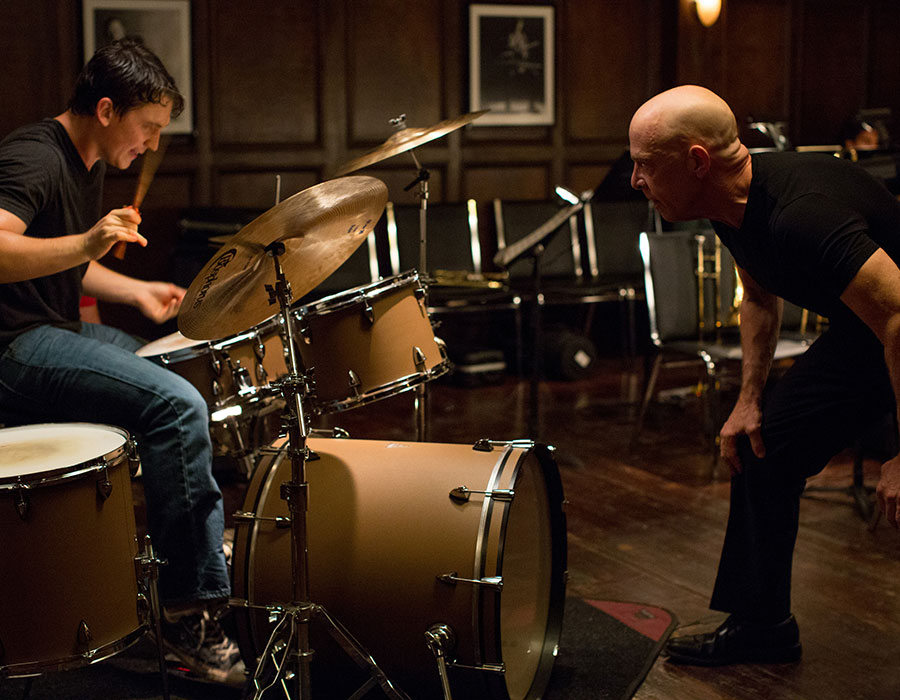
“The good news for me about Whiplash—Juno is another one—is it was a great movie, and I’m unabashedly proud to be a part of it,” Simmons says.
In January 2015, he won a Spotlight Award. Then he won a Golden Globe. In both of his improvised acceptance speeches, he thanked his wife, kids, and parents. It felt right. He mulled on that theme. Come Oscar day, he hedged.
“I sent out an e-mail to about twenty people, the main people involved, just to say, ‘Thank you, and I apologize for not saying your name in my acceptance speech, but I’m going to talk about family and I hope you understand. I lost my mom a little over a year before and my dad just before that,’” Simmons says. “I shot that off about a half an hour before the ceremony.”
He gave the speech. And it was a shocker. To everyone except family.
“That was just so true to his character,” says Kathleen Kimble, a cousin who lives in Missoula. “He’s just like that.”
The Simmons siblings reunited again in Montana in early May while J.K. was between filming a movie in L.A. called The Meddler, with Susan Sarandon, and another in Germany called The Lake, a drama about Navy SEALs. They gathered again inside the UM Music Recital Hall. This occasion? The dedication of a scholarship in memory of their father—just like their mom wanted.
“Their legacy in Missoula is they don’t need to have an Oscar-winning son to have a major positive impact,” Simmons says. “They were Missoula’s grandparents.”